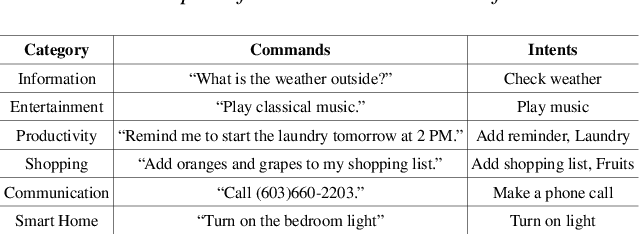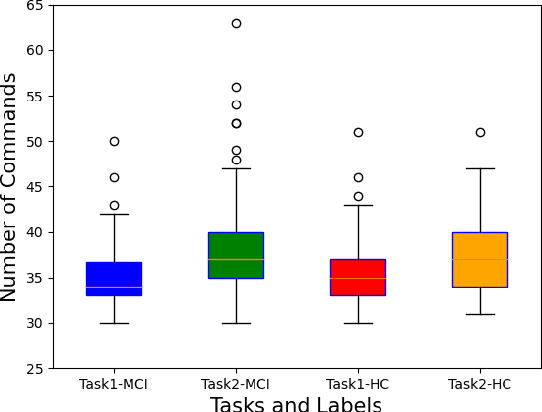Caroline Summerour
Cog-TiPRO: Iterative Prompt Refinement with LLMs to Detect Cognitive Decline via Longitudinal Voice Assistant Commands
May 22, 2025Abstract:Early detection of cognitive decline is crucial for enabling interventions that can slow neurodegenerative disease progression. Traditional diagnostic approaches rely on labor-intensive clinical assessments, which are impractical for frequent monitoring. Our pilot study investigates voice assistant systems (VAS) as non-invasive tools for detecting cognitive decline through longitudinal analysis of speech patterns in voice commands. Over an 18-month period, we collected voice commands from 35 older adults, with 15 participants providing daily at-home VAS interactions. To address the challenges of analyzing these short, unstructured and noisy commands, we propose Cog-TiPRO, a framework that combines (1) LLM-driven iterative prompt refinement for linguistic feature extraction, (2) HuBERT-based acoustic feature extraction, and (3) transformer-based temporal modeling. Using iTransformer, our approach achieves 73.80% accuracy and 72.67% F1-score in detecting MCI, outperforming its baseline by 27.13%. Through our LLM approach, we identify linguistic features that uniquely characterize everyday command usage patterns in individuals experiencing cognitive decline.
Analyzing Multimodal Features of Spontaneous Voice Assistant Commands for Mild Cognitive Impairment Detection
Nov 06, 2024



Abstract:Mild cognitive impairment (MCI) is a major public health concern due to its high risk of progressing to dementia. This study investigates the potential of detecting MCI with spontaneous voice assistant (VA) commands from 35 older adults in a controlled setting. Specifically, a command-generation task is designed with pre-defined intents for participants to freely generate commands that are more associated with cognitive ability than read commands. We develop MCI classification and regression models with audio, textual, intent, and multimodal fusion features. We find the command-generation task outperforms the command-reading task with an average classification accuracy of 82%, achieved by leveraging multimodal fusion features. In addition, generated commands correlate more strongly with memory and attention subdomains than read commands. Our results confirm the effectiveness of the command-generation task and imply the promise of using longitudinal in-home commands for MCI detection.
Exploiting Longitudinal Speech Sessions via Voice Assistant Systems for Early Detection of Cognitive Decline
Oct 16, 2024



Abstract:Mild Cognitive Impairment (MCI) is an early stage of Alzheimer's disease (AD), a form of neurodegenerative disorder. Early identification of MCI is crucial for delaying its progression through timely interventions. Existing research has demonstrated the feasibility of detecting MCI using speech collected from clinical interviews or digital devices. However, these approaches typically analyze data collected at limited time points, limiting their ability to identify cognitive changes over time. This paper presents a longitudinal study using voice assistant systems (VAS) to remotely collect seven-session speech data at three-month intervals across 18 months. We propose two methods to improve MCI detection and the prediction of cognitive changes. The first method incorporates historical data, while the second predicts cognitive changes at two time points. Our results indicate improvements when incorporating historical data: the average F1-score for MCI detection improves from 58.6% to 71.2% (by 12.6%) in the case of acoustic features and from 62.1% to 75.1% (by 13.0%) in the case of linguistic features. Additionally, the prediction of cognitive changes achieves an F1-score of 73.7% in the case of acoustic features. These results confirm the potential of VAS-based speech sessions for early detection of cognitive decline.
 Add to Chrome
Add to Chrome Add to Firefox
Add to Firefox Add to Edge
Add to Edge